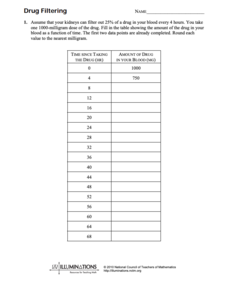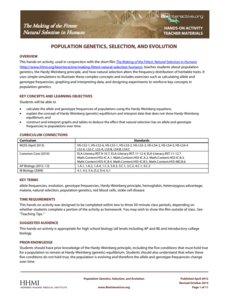Curated OER
Blood Highways
Fifth graders read an informative paragraph about how blood travels through our bodies. Then, they fill in the missing letters for words that label things in the circulatory system. An answer key is provided on page two. An interesting,...
Alcohol Education Trust
Talk About Alcohol: What is BAC (Blood Alcohol Concentration)?
Educate your class about blood alcohol levels by combining health with math practice. Class members read a little bit about blood alcohol concentration and then solve some problems related to determining alcohol levels and alcohol...
Howard Hughes Medical Institute
Got Lactase? Blood Glucose Data Analysis
Many physicals include a blood glucose test, but what are doctors actually testing? Scholars graph and interpret blood glucose data, allowing them to observe the differences in lactase persistence and draw conclusions. They then connect...
Curated OER
Making Blood!
students research blood's components, and use their math skills to recreate a model of whole blood using commonly found food items.
Curated OER
Counting Blood Cells
Students observe number sense by participating in an estimation activity. In this blood cells lesson, students identify the importance of blood cells in the human body and discuss how tiny they are. Students utilize paper dots as a...
Illustrative Mathematics
High Blood Pressure
Does watching TV increase one's blood pressure? Assess student understanding of how study design dictates whether a conclusion of causation is warranted. Use this as a prompt for a small group or whole class discussion, or as a part of a...
Curated OER
The Amazing Heart
Students examine human blood flow by comparing the pulse of athletes. In this human body lesson, students discover the equation for finding the cardiac output from a human heart. Students identify heart rates of accomplished...
Curated OER
Blood Types
In this algebra learning exercise, students examine the 4 different blood types, and make a graph deciding which blood types are compatible with each other when it comes to donors. There are 9 questions with an answer key.
Curated OER
Probability Worksheet
In this probability learning exercise, students compute the probability that a husband and wife will have the same blood type.
Curated OER
Where Does the Blood Go?
Students investigate where the blood in our hearts travels by observing a diagram in class. In this cardiovascular lesson, students examine their own heart by checking their pulse in class. Students investigate a human body...
CK-12 Foundation
Fraction Comparison with Lowest Common Denominators: Oranges and Blood Oranges
Comparing fractions is the focus of a five-question interactive in which mathematicians use oranges to answer real-world multiple-choice, true or false, and discussion questions.
Curated OER
Using Math to Get to the Source
In this lead blood levels worksheet, students use mathematics to determine the source of lead poisoning in children. They are given data, they analyze the data and they graph the blood level measurements vs. the mean blood lead level in...
Alabama Learning Exchange
Bloodstain Pattern Doesn't Lie......
An interesting instructional activity on hypothesizing about the diameter of a drop of blood that is splattered. To test their theories, learners work in groups to make blood droplets splatter from different heights. They use graphed...
Curated OER
Mathematics in Bioengineering: Its Application for Today's Students
High schoolers explore the different fields of bioengineering. They will create and interpret graphs from cancel cells data. They then calculate the amount of drugs found in blood and eliminated by the body over time.
Curated OER
Navajo Weaving: A Lesson in Math and Tradition
Combine geometry and tradition with a lesson that spotlights Navajo weaving. The book, The Goat in the Rug by Charles L. Blood and Martin Link hooks scholars before watching a video of Navajo people tending their sheep and beginning...
Curated OER
Lub Dub
Students name the vessels and parts of the heart. They trace the path of blood through the heart. Students examine the function of the circulatory system. They recognize the differences between a hear when the body is at rest opposed to...
National Council of Teachers of Mathematics
Drug Filtering
In this chemistry instructional activity, learners calculate the amount of drug found in someones blood based on how long they have been taking the drug. There are 5 questions.
Curated OER
Crime Scene Documentation
Young scholars become forensic investigators. In this crime scene lesson, students go to the science lab which is the "scene of the crime." They collect evidence such as fingerprints, "blood" evidence, chromatography, footprints, and...
Howard Hughes Medical Institute
Population Genetics, Selection, and Evolution
The Hardy-Weinberg principle states that alleles and genotypes remain constant in the absence of evolutionary influences. Scholars complete a simple hands-on activity applying the Hardy-Weinberg principle to sample data. They observe how...
Curated OER
Probability in Daily Life
Sixth graders examine the use of probability in daily life. In this probability lesson plan, 6th graders listen to scenarios from Louis Sachar's, Holes, after discussing probability in everyday life. They pretend they are detectives who...
Curated OER
Civic Engagement: Community and Social Action
Explain that today's project is that students will get groups create a survey to poll their classmates on what they do to stay healthy. The results will then be shown on a bar graph.Students brainstorm ways of keeping healthy and teacher...
Curated OER
When One Beat Is Better Than Two
Fourth graders create an individualized wellness plan that addresses these controllable health risk factors:obesity, high cholesterol level, high blood pressure and inactivity.
Curated OER
Pirate Plays
Students performing a scene about pirates and spend time making a measuring meters incorporating the main character, Captain Blood to add interest. They use meter sticks measuring items from the play and record their answers in meters.
Curated OER
Keeps on Pumping
Students measure and calculate heart rates per minute and for other units of time. They determine the amount of blood pumped by their heart during various intervals of time.
Other popular searches
- In Cold Blood
- Blood Pressure
- Blood Types
- Blood Vessels
- Blood Flow
- Blood Platelets
- Blood Cells
- Forensic Science Blood Type
- Blood Circulation
- Red & White Blood Cells
- Blood Typing
- Cold Blooded























